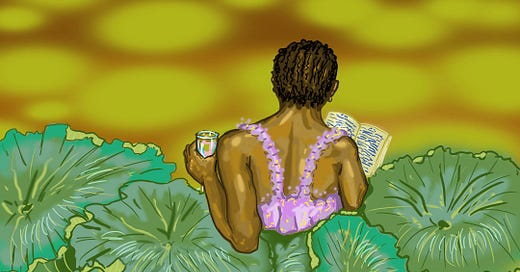Lote by Shola Von Reinhold
This heady page-turner had me googling where the line was, what was real. Lote defies genre, it’s a tale of tedium, class warfare, debauchery, transness, nerdhood and high camp with a winding plot and switching registers. I rated the historical detail and its dramaticisation in fiction that would give the Ibis Trilogy a run for its money. Von Reinhold is a master at embroidering fiction and the archive together. Brimming with apocrypha, the book dredges up the lives of pre-Windrush Black artists, some real, some crafted. Mathilda, the protagonist, is relatably fed up, less excited by Utopia than Arcadia, looking to an embellished past to survive the present, a shiny tempting reflex to our futureless present where ‘utopia’ has become a defanged buzzword.
“Arcadian Personality types… crave a paradise knit out of visions of the past like their more illustrious cousins, Utopians, do with the future… The classic counterpart traits of the Arcadian, like a fondness for old objects and buildings… were as far as I was concerned, much easier to inhabit for white people…. Being born in a body that’s apparently historically impermissible, however, only meant I was not as prone to… the various and insidious forms of history worship and past-lust… I could… exhume a dead beautiful feeling, discover a wisp of radical attitude pickled since antiquity…” Shola Von Reinhold in Lote (Jacaranda 2020: 24-25)
Don’t get me wrong, “archive” like “liminal” or “deconstruct” is a staple of artspeak which has a way of slitting the pulley system behind my eyelids. But once I got past a jittery first chapter and comfy with the very free form, the book ratchetted me up a rollercoaster of burning mystery, uneasy friendships and dialogue rippling with brutal roasts. I rate an informative read dressed in the clothes of glamour, scandal and excess. It got me looking into the life of sculptor Ronald Moody and the racism of Virginia Woolf and the Bloomsbury group. And that’s part of its genius, LOTE didn’t have to euphemise the past or present to hook me by the nostril. I thought Von Reinhold’s grasp on the bitter ironies of lived experience, especially life in a racialised queer body in Britain was enough.
LOTE leaves a parting gift. It gives shimmering commentary on the dread tiptoe-on-matchstick dance of moving in bourgeois circles as a class impostor. But like a wry Fabergé Easter egg embedded in the novel, the subtlety and outrage with which Von Reinhold rips into artsy-academic scenes requires the reader to have lived these worlds and in some way be part of their fabric to really care. In a delectable spiky way, joke’s on you.




